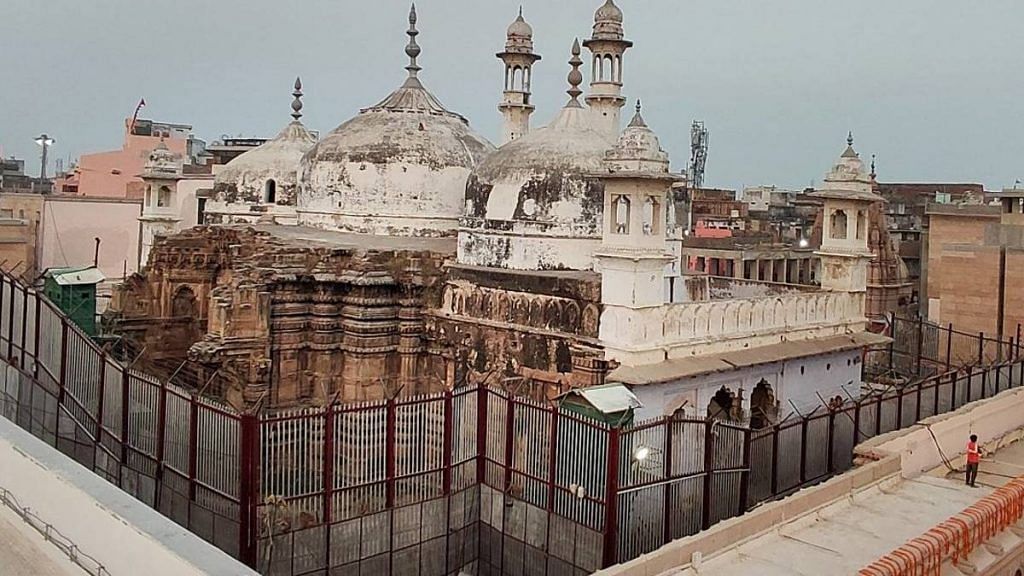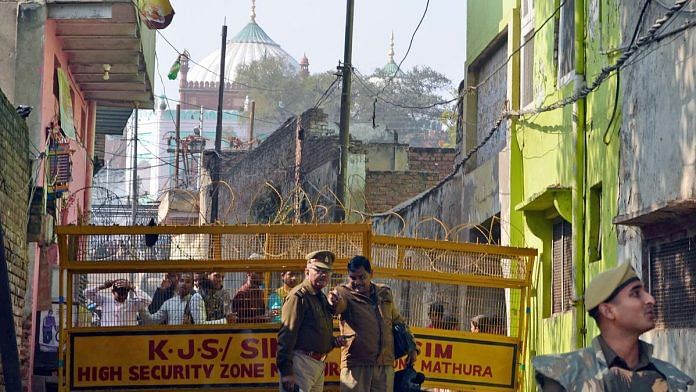Had Allah not been repelling some people by means of some others, the monasteries, the churches, the synagogues and the mosques where Allah’s name is abundantly recited would have been demolished” (Quran, 22:40). This is the middle portion of the verse that talks about religious persecution, and sets out the moral justification for retaliation against it. The immediate audience of this verse was the small band of Prophet Muhammad’s followers who were harassed for their belief, and made to flee their homes. Significantly, the verse mentions the houses of worship belonging to non-Islamic religions as places where God’s name is often remembered. Moreover, the mention of masjid is as a generic word for a place of worship, and not specifically the Muslim structure called mosque. Therefore, the import of this verse is universal. In principle, the destruction of a non-Islamic place of worship is as abhorrent as that of a Muslim mosque.
So, if the Quran uses such strong words as “repelling one people by another” if a community destroyed temples of other religions, how come Islamic history is chock-a-block with instances of desecration and destruction of places of worship of other religions? In the chronicles written by Muslim historians, there is not even a polite attempt to hide their glee in recording the spectacle of humiliation inflicted on Hindus, Jews, Christians, Buddhists, Zoroastrians and others. The Muslim conquerors revelled in it. Much later, the poet Iqbal gloated: Di azaanein kabhi europe ke kaliisaaon mein (We called Azan in the churches of Europe); Kisne thanda kiya aatish-kada-e-iran ko (Who else doused the fire of the Zoroastrian temple?); Kis ki haibat se sanam sahme huye rahte they (Who made the idols in the temple tremble in fear?).
There developed a cult of but-shikan (idol breaker), and from Mahmud Ghaznavi to Aurangzeb, most Muslim rulers wanted to live up to this ideal. So much so that a king of Kashmir was known as Sikandar Butshikan, so extensive were his depredations against Hindu temples. When their power waned, and they could no longer walk into a temple to smash the idols, Iqbal lamented: But-shikan uthh gaye baki jo rahe butgar hain (The idol-breakers are long gone, leaving behind the idol makers).
One may ask, how could it be going on throughout the Islamic history if it’s so clearly against the dictates of the Quran, and how could the Muslims feel no remorse for it? Was it even considered bad ever? More importantly, is it considered bad even now?
Also read: Should Indian Muslims cling on to a non-mosque? Gyanvapi is a living monument of past wrongs
If Islam’s against temple destruction…
To Seek answers to these questions, I tried to know the authoritative Islamic position on the subject, and wondered if there was any fatwa, issued by a well-regarded mufti on the following questions: 1. According to Islam, is it permissible to destroy the house of worship of other religions? 2. Is it permissible to build a mosque on such a site? 3. If built, whether such a structure could be a recognised as a mosque? and 4. Would the Namaz in such a mosque be jayez or valid?
Repeated rummages through the fatwa archives drew a blank. There is no such fatwa; at least, no well-known fatwa by a major mufti.
This absence is surprising, and appears like omertà, a conspiracy of silence. In a culture of religious correctness where obsession with halal-haram and jayez-najayez is so great that juristic opinion is sought on the permissibility of such frivolous matters as nail-paint and hair-dye, it is surprising that such a shocking matter as the destruction of temple was never problematised for juristic opinion under Sharia. Could it be that in the reigning theo-politics, there was a consensus over its correctness? Likely. However, one is inclined to believe that if this issue was problematised, the juristic opinion couldn’t uphold the validity of the destructive spree against temples.
Now that times have changed, there is an increasing realisation that what happened in the past was not right, and though there is no outright condemnation, attempts are made to downplay, explain away and rationalise the events in contextual terms. So, while condoning the destruction of temples in the past, ordinary Muslims of today are more likely to say that Islam doesn’t permit any violence against temples, and that a mosque couldn’t be built on a site which is illegitimately acquired, and that ill gotten money couldn’t be used for this purpose. They are also going to cite two examples in particular: how the Prophet insisted on paying the market price for the land he acquired for the mosque in Madinah, and what liberality of spirit caliph Umar showed towards safeguarding the churches in Jerusalem from his own army.
So, as a well-meaning Muslim is likely to argue that what happened in the past was not true Islam, and that the true spirit of Islam is against any sacrilege committed against other religions, what does one do with the living monuments of the folly of the past? How to reconcile the Islamic principle of non-aggression against other religions with such mosques that are clearly built on the site of demolished temples, particularly the ones about which there is no dearth of archaeological and historical evidence, as in the case of Gyanvapi mosque in Kashi and Shahi Idgah mosque in Mathura.

Give up claims on Kashi, Mathura
In view of the strong evidence, the Muslims don’t dispute that these two mosques are built on the sites of demolished temples. However, to keep them as mosques, they invoke the Place of Worship (Special Provisions) Act 1991, which protects the status of a place of worship as it was on 15 August 1947.
However, before taking a recourse to the said law, the Muslims might do well to resolve some contradictions with which their reasoning had been riddled. For one, if Islam doesn’t permit the destruction of temples, and if a mosque can’t be built on a piece of land that is illegitimately occupied, could the said two structures of Kashi and Mathura be legitimately called mosques, and would the prayers offered in them be valid? Going by the rationale of the publicly held positions of Muslims, both Gyanvapi and Shahi Idgah are non-mosques.
Furthermore, when they contested the case for Ram Janmabhoomi in Ayodhya, they took the plea of the paucity of proof of the demolition of a temple on that spot. Going by this line of argument, and in view of the abundance of evidence in Kashi and Mathura, shouldn’t they have relinquished their claims on Gyanvapi and Shahi Idgah before pursuing this line on Ayodhya?
Anyway, better late than never. Giving up the claims on Kashi and Mathura isn’t defeatism, but radical reconciliation. No one can deny the truth that during the Muslim rule, innumerable temples were destroyed. The road to reconciliation goes through Ayodhya, Kashi, and Mathura. The Muslims didn’t take the first route. But, for their own sake, and for the sake of truth and justice, they must not say no to the second and the third.
Offering the remaining two of the three sites, which have been asked for in the symbolic return of the figurative 3,000 of destroyed temples, is not a bad deal. It is less than the five villages that Krishna asked for the Pandavas for the sake of peace and conciliation. The Mathurapati shouldn’t be returned empty-handed again.
This is the time to correct the skewed moral compass of Muslim politics by aligning it with their stated religious principles.
The Muslims should look into their hearts, and ask themselves if their religion permits the destruction of other religion’s temples, and construction of mosques on top of them. They should also ask themselves the WWMD (What Would Muhammad Do) question, and answer if the Prophet would approve of it.
Ibn Khaldun Bharati is a student of Islam, and looks at Islamic history from an Indian perspective. He tweets at @IbnKhaldunIndic. Views are personal.
Editor’s Note: We know the writer well and only allow pseudonyms when we do so.
(Edited by Prashant)




Before writing such a strong opiniated comment one should themselves makes some research, there is enough evidence that temple existed below Babari masjid.
I dont support the fact that babri should’ve been destroyed but if your argument is there was no temple there then sorry my friend there was.
Before writing such filthy opinion, the author should be aware that the supreme court has clearly stated that there was no evidence that a temple existed at the place of babri masjid.